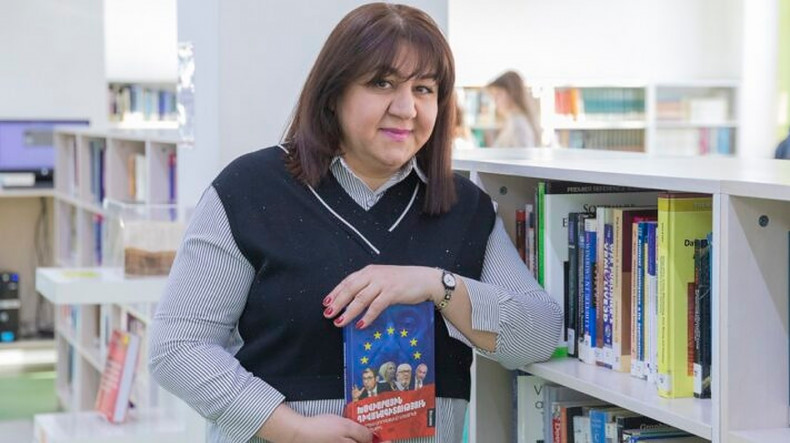
'Caviar Diplomacy': What is the price of Europe's silence on Azerbaijan's use of phosphorus weapons?
The Armenian version of the report "Caviar Diplomacy: How Azerbaijan Silenced the Council of Europe” can shed some light on the silence and indifference of international organizations in the wake of Azerbaijan’s months-long blockade of the Lachin Corridor, the sole road linking Artsakh to Armenia.
On February 19, the birthday of prominent Armenian writer Hovhannes Tumanyan, which is also celebrated as Book Giving Day in Armenia, the presentation of the report translated into Armenian by journalist Siranuysh Muradyan, who has covered the Council of Europe activities for many years, and published by the Newmag Publishing House was held in Yerevan.
.jpg)
The book's cover features former President of the Parliamentary Assembly of the Council of Europe (PACE) Pedro Agramunt, former Chairman of the European People's Party Group in PACE Luca Volontè and German MEPs Karin Strenz and Axel Fischer, who were deprived of their parliamentary immunity, under the gaze of dictator Ilham Aliyev.
Experts of the think tank European Stability Initiative (ESI) identified European officials involved in the "caviar diplomacy": they received bribes from Azerbaijan to lobby for the country, remain silent or defend Baku's interests. ESI revealed the facts in two reports for 2011-2012 and for 2016-2017. The report was followed by the resignation of Pedro Agramunt as PACE president. Azerbaijan has not been held to account for its corrupt activity to date.
Siranuysh Muradyan began translating the 156-page report back during the 2020 war in Artsakh.
"I want the Armenian readership to know about Baku’s disgraceful activity. I want the people to know the price of Europe's silence on the use of phosphorus munitions during the war, the use of weapons banned by the European Convention or the bombing of a maternity hospital in Artsakh," she said.
Despite the ongoing prosecutions in Germany following the corruption revelations and Italy’s conviction of former MEP Luca Volontè, who received a €2.5 million bribe from two officials from Azerbaijan, Muradyan is unhappy with the response of law enforcement agencies in the PACE member states to the scandalous revelations.
"This research has to bring some consequences. For more than a decade, the names and photos of the corrupt persons have been disclosed in the reports, however the results are totally unpleasing. Several investigations have caused a stir in the Bundestag now. There is also the 4-year prison sentence handed down to Luca Volontè in Italy. But the tentacles of Baku’s corruption scandal are everywhere. Therefore, European and German law enforcement authorities should thoroughly investigate whether Otto Hauser, Alexander Funk, Kay Wegner, Daniela Ludwig, Markus Held and others were also involved in the scandal," Muradyan stated.
The journalist-translator stresses if a PACE delegate is involved in a corruption scandal, it means the whole Parliamentary Assembly is also involved in it, as PACE is committed to imposing sanctions for violations of the European Convention. Meanwhile, Azerbaijan continues blocking the Lachin Corridor and creating a humanitarian crisis in Artsakh amid the salience of the world community, while PACE claims to promote human rights, rule of law and democracy.
"Which of these principles is now respected in the Berdzor Corridor? The European Stability Initiative experts, too, constantly talk about the weak response following their revelations, there are many persons who must face prosecution,” Muradyan told Panorama.am, stressing that new facts have been added to those presented in the report over the recent years, the PACE Anti-Corruption Body has released a 200-page report which reveals the disgraceful picture in the Council of Europe.
.jpg)
"We normally link the caviar diplomacy to Azerbaijani corruption. But we should remember that it is not one-sided, it is also about European and Western corruption. To-be diplomats should be well aware that when representing the interests of their country they may meet with people who have personal interests," said political analyst Tevan Poghosyan, speaking about the importance of translating the report and stressing the need to work with the right institutions.
Former MP Naira Karapetyan, who has worked at PACE for many years, stressed that she was a witness to the published book and saw the developments following the backstage agreements.
"PACE has now forgotten everything that got flesh and blood in 2017, when these revelations resulted in stricter rules of conduct for parliamentarian, including declaration of assets, monetary limits on gifts. It was supposed to restrain Azerbaijan a bit, but amid the game of world powers, Azerbaijan stood with Ukraine and got the green light and the support of many, becoming a direct fuel partner of Europe," Karapetyan said, urging the Armenian delegation to make intense efforts to disclose Azerbaijan’s actions to PACE.
.jpg)
Artsakh’s Foreign Minister Sergey Ghazaryan strongly believes that even now the Azerbaijani leadership spares no effort to “buy” the support of the Council of Europe and to silence critics of Azerbaijan's human rights violations and poor state of democracy.
Ghazaryan also underscored in his speech at the book presentation that during the 44-day war and after it the international structures continued turning a blind eye to the crimes committed by Azerbaijan against the Armenian people, which has resulted in Azerbaijan’s brazen conduct to the extent that the Azerbaijani troops are now stationed on Armenia’s sovereign territory and Baku has been keeping Artsakh and its 120,000 people under siege for over two months amid the inaction of the institutions claiming to defend universal human rights.
The top photo is from the page of the American University of Armenia.
Related news
Newsfeed
Videos






























